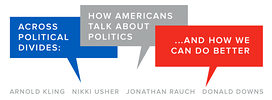It’s the Stupid Institutions
Jonathan Rauch writes, “It’s the institutions, stupid.” He points to a need for civic institutions, and he sees social media platforms as institutions in need of reform. Let me add my thoughts:
1. Rauch writes, “an effective way to reduce intergroup hostility is to put the groups to work on a common mission”
Recently I gave a talk at a Rotary Club in Houston. The audience proved Rauch’s point. Club members differ considerably in their politics, but joining together for a common charitable purpose helps them see the other side as human.
But how are we going to interest younger people in Rotary Clubs or some equivalent?
2. Rauch is more positive than I am toward the idea of Google or Facebook curating content. I think that is a hopeless cause. Consider Twitter’s ambition to ban political advertising. Does that mean that opponents of Planned Parenthood are not allowed to advertise, because that involves political opinion? But then does that mean that Planned Parenthood itself is not allowed to advertise? I think that centralized curation of content is a morass for Internet platforms.
The problem with the Internet platforms is not that bad people put really bad content on them. The problem is what good people think of as putting good content on them. Otherwise well-credentialed, intelligent people are proud of their Twitter put-downs and Facebook proclamations. Seeing people talk politics on social media gives me the same feeling that I get from watching the anger that breaks out following a confrontation in an intersection between a bicyclist who won’t slow down and motorist who fails to yield.
I would advise everyone who wants to use the Internet to say something about current events to put at least a 3-day delay on their posts. If you think in terms of a delay, that increases the chances that your reason will kick in before your emotions get carried away.
But I don’t think that there is an easy solution to the problems that the Internet poses for discourse.
The Sociology of Journalism
Nikki Usher refers to Robert Merton’s distinction between cosmopolitans and locals; I would add that a more recent book by David Goodhart, The Road to Somewhere, draws the same distinction, using the terms “anywheres” and “somewheres.”
She points out the irony that the cosmopolitans are narrow-minded in their contempt for the locals. She says that cosmopolitans view the locals as barbaric. I would quibble and say that the cosmopolitans view the locals as backward. The epithets that they toss around most frequently (e.g., racist) are more along the oppressor-oppressed axis.
A monoculture may exist within individual media outlets, but I am not sure I would characterize journalism as a whole that way.There are conservative journalists. And there are journalists who seem to empathize with locals. And as an economist I would expect that regardless of the cosmopolitan bias in schools of journalism, the fact that locals constitute a significant market is likely to sustain media outlets that serve that market.
The problem is that the antipathy between cosmopolitans and locals, along with the fragmented media environment, means that we will not experience a common narrative. This is a difficult problem, and I cannot see a solution.
Emotional Correctness and Higher Education
Donald Downs refers to another troubled institution, higher education. He pinpoints the problem of “emotional correctness.” I agree with Downs, and with Jon Haidt and Greg Lukianoff as well as with Anthony Kronman, that colleges and universities ought to recommit to the values of rigor and open inquiry.
Unfortunately, we are seeing on campus a form of reductionist progressivism that actually does take the oppressor-oppressed axis as the sole basis for framing issues. The campus justice activists are not only subject to the psychology that inclines us away from Persuasion Mode and toward Demonization Mode. Their very ideology justifies Demonization of dead (and living) white males while treating the values of free speech and open inquiry as tools of oppression.
Moreover, the situation on campus is tied in with the inability of colleges to make African-Americans and women feel secure and confident there. If attempting to uphold standards of rigor gets labeled as “racist” or “the patriarchy,” then faculty and administrators will be reticent about advocating those standards.
Once again, I find it easier to describe the problem than to offer a promising solution.

